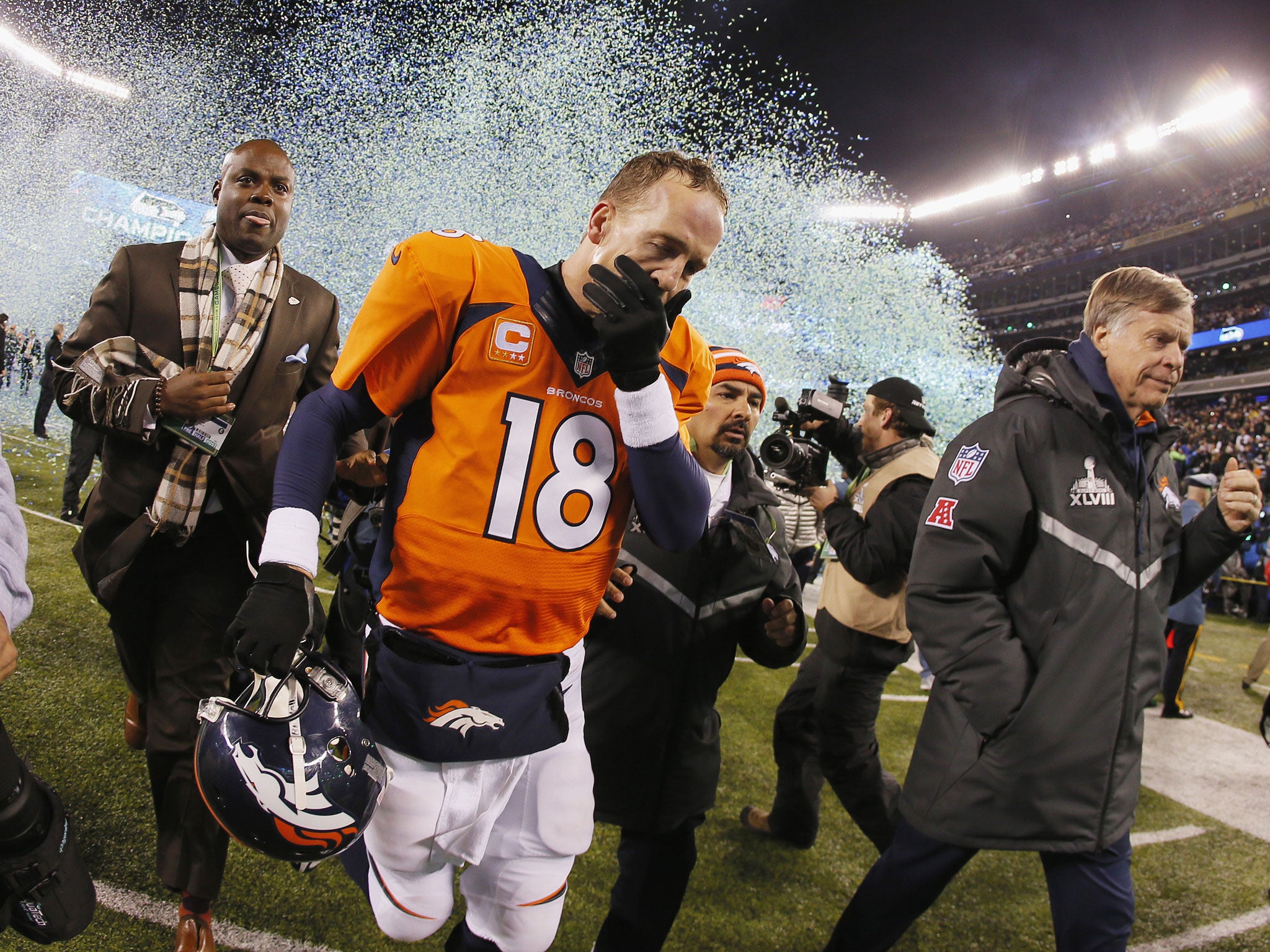Super Bowl 2014: Peyton Manning left in the shade by clinical Seattle Seahawks
The Denver Broncos were soundly beaten in New Jersey

Pete Carroll’s explanation of one of the more astounding – if not exactly thrilling – Super Bowls in memory could not have been simpler. “The things that were supposed to happen, happened,” the Seattle Seahawks’ head coach declared after his team’s comprehensive demolition of the Denver Broncos.
And so on Sunday evening they did. Just as Seattle had plotted, Peyton Manning, the Bronco’s legendary quarterback, was reduced to near-irrelevance. And just as planned, Seattle’s defense, now to be counted among the most formidable in NFL history, throttled the life out of statistically the most prolific offense ever produced.
But no-one expected it to happen quite this way: a 43-8 steamrollering that left Denver, the marginal ante-post favourites, on the wrong end of the most lop-sided championship game since the Dallas Cowboys’ 52-17 annihilation of the Buffalo Bills in 1993.
The Broncos now slink back home, deflated if not disgraced. As for Manning, both his immediate future and his place in football history are plunged into fresh uncertainty. The Seahawks by contrast return to Seattle for a victory parade on Tuesday in celebration of the franchise’s first ever Super Bowl championship and that city’s first title of any description since the basketball SuperSonics (now long departed to Oklahoma) won the NBA crown back in 1979.
Super Bowl XLVIII in East Rutherford,New Jersey, just across the Hudson river from Manhattan was the first played in a cold weather city in the open air, and might have sealed the 37-year-old Manning’s place as the greatest quarterback of his era. Instead, amid perfect playing conditions and an unseasonably warm kick-off temperature of 10C, it will go down as arguably his worst single NFL loss.
In the 2013 regular seasonManning shattered league records for touchdown passes and total yards. But Sunday night’s debacle will revive the criticism that when it came to the very biggest games, he did not deliver as he should.
Conceivably Manning, who had quadruple neck surgery in 2011, may now choose to retire, after a 16 year career that has yielded just one Super Bowl ring. Whatever his decision, this pyschological scar may be the hardest of all to heal. “I don’t know if you ever really get over it,” he said afterwards. “You have to find a way to deal with it and process it.”
In fact, Manning’s failure was the measure of the Seahawks’ ruthless domination. From the start, the game was an anti-climax. On their very first possession, at their own 5-yard line, the Broncos miscued a snap and conceded a two-point safety – after just 12 seconds. It was the fastest score in Super Bowl history and an omen for everything that followed: fumbles, interceptions and drives that simply fizzled out, stifled by Seattle’s take-no-prisoners defense that kept every channel closed.
Curiously, Manning’s pass completion rate, 34 of 49 for a total 280 yards, was a Super Bowl best. But he was never allowed to find his rhythm. The Broncos didn’t manage a first down until midway in the second quarter when they trailed 15-0.)
At half-time they were behind 22-0, and didn’t even get on the board until the final play of the third quarter. Manning’s 14-yard touchdown pass to Demaryius Thomas, followed by a two point conversion, reduced the deficit to 36-8, but who cared? Certainly not the orange-clad Denver fans who by then were already abandoning the MetLife Stadium in droves.
For Seattle this was not an individual triumph but, as Carroll implied, the ultimate vindication of a team and a strategy. True, their quarterback Russell Wilson performed tidily (206 yards thrown and two touchdowns), but the MVP award went to Seahawks’ linebacker Malcolm Smith who capped a crushing display with a 69-yard interception return of a Manning pass, late in the second quarter.
It was the first time in a decade that the honour went to a defensive player. Equally justly, it could have gone to Seattle’s entire defensive line. “We loved hearing about the Broncos’ offense because we felt that, after the game, you’d be hearing a lot about the Seahawks’ defense,” Smith’s fellow linebacker Bobby Wagner declared. How right he was.
And for Seattle, it could get better still. ‘Dynasty’ is an overworked word in the NFL; accident and injury can upset the best laid plans. But the current Seahawks are better placed for a long spell of excellence than any team since the New England Patriots, winners of three of four championships between 2002 and 2005.
At 25, Wilson is the third youngest Super Bowl winning quarterback in history, with most victories in his first two seasons in history. The team as a whole is the youngest ever to go all the way, with an average age of 26.4 years. Championship droughts in the Pacific North West may soon become a distant memory.
Join our commenting forum
Join thought-provoking conversations, follow other Independent readers and see their replies
Comments
Bookmark popover
Removed from bookmarks